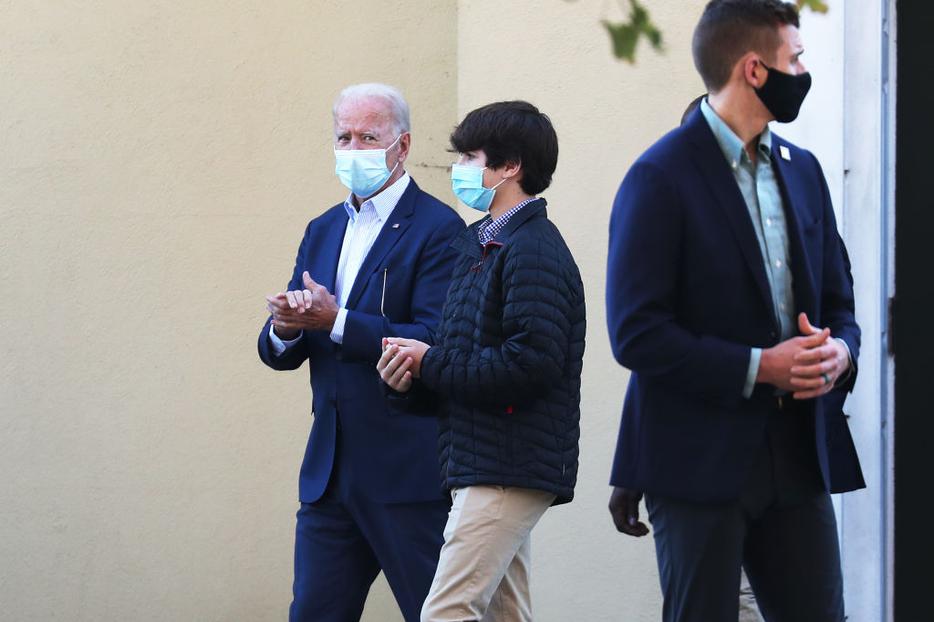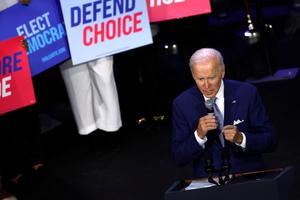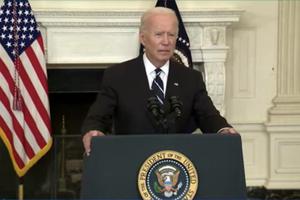If We Don’t Teach the Faith the Man in the Oval Office Will
COMMENTARY: Catholic leaders must explain why there’s no conflict between the Church’s economic teachings, and those on sexual expression. Both proceed from the Great Command to love God and neighbor, and both manifest an option for the poor and dispossessed, spiritually and empirically.

The United States has (almost certainly) just elected its second Roman Catholic president. One thing is certain. He will be “teaching” Americans and the world what it means to be Catholic, whether or not he intends to, and whether or not what he teaches accurately characterizes the faith. This is how teaching happens today: It’s a function of the media’s willingness to provide a microphone and favorable coverage to an important, successful person with a point of view the media likes. Expertise and nuance are often optional.
But I am saddened over some of the lessons a President Biden might teach. This is because they could be wrong in ways that further divide American Catholics, give solace to people who may hold us in little esteem, and break my heart by driving a wedge between the sexual and economic aspects of our social teachings.
Biden might prove me wrong — and I hope so — but in particular I fear that he will prominently insist that governmental social welfare programs overlap perfectly with the Good Samaritan imperative, while Catholic teachings on sex, marriage and parenting contradict it. He will suggest that the latter represent merely “law” and “rules” which contradict the Great Commandment to love.
I should note up front that I am under no illusion that my reflections can influence a Biden administration to refrain from presuming to teach the faith. I am one little citizen. And Biden, like virtually every politician, is beholden to his party and his donors. But I am hopeful that many Catholics over the next four years, including those at high levels and/or with potent voices, might appeal to his affection for his religion, if not for all of its teachings. Some might even have the opportunity to approach the president privately. I also hope that, together, we might inspire Catholic leaders and institutions to have the courage to speak up more often, and with obvious pride, whenever law and Catholic social teaching intersect. It is defensive and inadequate to speak only in reaction to threats to our religious freedom.
I begin with Biden’s first likely error — claiming that state-sponsored social welfare programs are perfectly coextensive with the commandment to love the neighbor. It is undoubtedly true from a Catholic perspective that there’s a lot to like about governmental social welfare programs. They address human beings’ obligations to the poor, the immigrant and other vulnerable brothers and sisters in harmony with Catholic scriptural and social teachings. They are essential as a matter of human solidarity.
At the same time, however, some federal programs fail to achieve their aims and need revision or replacement. And while many do an okay job of providing the basics of life, they offer the poor very little in the way of social mobility. Social mobility requires attention to shoring up fragile family structures, to promoting marital parenting and marital stability. But more than a few federal programs completely overlook or even disincentivize stable marriage and marital parenting, despite the crucial role these could play in improving the prospects of poor children especially. Some federal efforts even blithely suggest that adults’ sexual freedoms are more important than children’s needs, or require Catholic and other religious institutions to cooperate with such a vision by means of mandates or conditions attached to grants or contracts. Such insistence might easily jeopardize both domestic and foreign aid programs led by well-loved, top-notch, long-experienced Catholic and other religious agencies.
In sum, a President Biden won’t be wrong about the harmony between some social welfare programs and some Catholic social teachings. But he will be wrong some of the time. Catholics with the expertise and the public voice to explain the difference will need to step up.
A second error almost certainly coming our way is a Biden administration’s dismissal of Catholic principles on sex, marriage and parenting, as harmful to human beings’ flourishing at worst, and irrelevant to it at best. Biden supports the contraception mandate, even against the Little Sisters of the Poor. He supports not only abortion without limits, but federal funding of abortion. And he famously signaled the Obama administration’s about-face on same-sex marriage by announcing his own support on a Sunday morning political show.
But Catholic teachings on sex, marriage and parenting (“sexual expression” for brevity) are simply the application of the Good Samaritan principle to our very nearest neighbors: boyfriends, girlfriends, spouses, children and extended family. This characterizes their earliest appearance at the origins of Christianity, and is supported by contemporary empirical data that evidences the rather astonishing overlap between Catholic sexual expression norms, and the well-being of individuals and families, especially women, children and the poor.
According to the Old and New Testaments, and Catholic theology from its beginnings to today, Catholic sexual expression norms are a crucial way of coming to understand what God’s love is like, and how we – made in his image — are to love one another. In brief, this love is specified or characterized by features visible in God’s creation, and affirmed and clarified by human experience. It involves differences (represented by two sexes) brought into a unity that not only enriches the other, but also transcends itself with the creation of new life. It links love with new life, and affirms the necessary coexistence of equality alongside diversity (also symbolized by male and female). This love engenders freedom because it is completely faithful and permanent, and demands mutual sacrifice. Then these principles, which characterize but apply beyond romantic love, are indispensable in helping us to understand a triune God (who exemplifies perfectly difference in unity) and the standards for real human love: sacrificial, a fruitful exchange of different gifts, and staying true. This is what the early Christians discerned, even as God’s creative design retained elements of mystery for them and for us. And contemporary empirical data robustly reveals its truth.
Empirical studies from leading secular journals reveal that today’s legal and cultural program of separating sex from “tomorrow” — from marriage, kin, children, and even love — has wreaked havoc in the Unites States. Children and poor women suffer the most because it produces high rates of divorce, nonmarital parenting, cohabitation, abortion and father-absence. We also have better evidence than at any time in history that children flourish best with their married, biological parents. It is a beautiful thing to arrange for alternative care for children when this structure is missing, but it is another thing entirely to promote laws and policies such as same-sex marriage or surrogacy that will separate every child involved from his or her mother or father or both. The unlinking of sex, marriage and parenting is also a huge driver of the gaps between socio-economic groups, because these gaps correspond a great deal to family-structure differences between richer and poorer and between those with more and less education.
It is hard to overestimate Catholics’ exhaustion respecting the “pelvic issues.” Both clergy and lay are tired of the media’s relentless focus on these subjects, and of caricatures of Catholics as sex-obsessed. I’m tired, too. But I can’t shake the thought that Catholics are vocationally called to engage. In the first several hundred years of Christianity, Christians were famous for challenging Greco-Roman sexual norms — and prevailing. Christians’ rejection of divorce, abortion, infanticide, and same-sex relations won them enthusiastic support from many who felt repressed by former norms, which were based largely upon social status and male privilege. Christians replaced these with norms reflecting God’s creative intentions, the imperative to care for the weak, and the equality between male and female, slave and free.
We are apparently being called to do something similar today, as one of the last institutions standing firm, and given the likelihood of a self-described Catholic president explicitly opposing Catholic norms. This means that, in the coming years, when Catholic leaders and institutions demand religious freedom protections against laws demanding cooperation with the state’s sexual expression norms, they will have to do a lot better than they’re doing now.
Today, Catholic leaders and institutions issue a lot of “hit and run” statements asserting only that “we cannot cooperate” with this or that commanded behavior (e.g. contraception, transgender surgeries, abortion, state-recognized same-sex unions), because it contradicts a Catholic “rule.” Over the next four years, however — in order to elevate respect both for religious freedom and for our teachings on sexual expression — Catholic leaders and institutions have to explain why there is no daylight at all between our economic teachings, and those concerning sex, marriage and parenting. We need to detail how both proceed from the Great Command to love God and neighbor, and how both express and realize an option for the poor and dispossessed, spiritually and empirically speaking. At the very least, and for the general welfare, the government must allow us the freedom to witness to these truths.
Supporters of particular federal programs and of the current sexual expression regime — politicians, political parties, the media and interest groups — will not fail to use Joe Biden’s self-professed Catholicism to their advantage. They have already begun. Over these next four years, therefore, Catholic voices will have to be unusually involved in certain public discussions, as well as highly articulate, nuanced, intelligent, and proud, never defensive. The public square is not a particularly pleasant place to be these days. But the alternative is to allow the White House to “teach the faith.” If we don’t, the Oval Office will.
- Keywords:
- biden
- catholic faith
- catholic teaching
- sex and marriage














